#joen arliss
Photo

The Lady Killer Affair by Joen Arliss
Paperback from AbeBooks
2 notes
·
View notes
Text
Shadow Over Seventh Heaven Review, Part I: Last Night I Dreamt I Went to Maljardin Again

Once, April Tennant had been the greatest screen star of all. Even now that this stunning creature was gone, the victim of a hideous accident, her name still cast a magic glow. And nowhere was her haunting spell more alive than within her great walled estate of San Rafael.
It was here that April had lived in her storybook marriage with famed actor Richard Morgan. It was here that her memory was worshipped still. And it was here that lovely young Jenny Summers came as Richard Morgan's new bride--to discover the terror behind the tinsel in this place transformed from a paradise of the living to a hell of the undead.... (inside front cover)
Welcome, fellow Strangers and all others who happen upon this post. This week, I have decided to begin a new series exploring the Gothic novels written by co-creator and first headwriter of Strange Paradise, Ian Martin, under the pen name Joen Arliss. Mostly, the purpose of this series will be to compare the plot and characters of Strange Paradise and those of his novels and what that may indicate about his original intentions for the overarching story of the soap opera.
I got the idea to start this series while writing my review of Episode 26, after the contents of an article referenced in one of the scenes reminded me of the events in this book. On his now-defunct website Maljardin.com, Curt Ladnier covered some of the similarities between “Here Goes the Bride,” the CBS Radio Mystery Theater drama from which this book was adapted, and Strange Paradise, but I wanted to dive deeper and do one of my characteristic overanalyses. So fly with me to the grand southwestern estate of San Rafael and together let’s explore Shadow Over Seventh Heaven--and let me warn you, there will be spoilers for the entire Maljardin arc of SP.
As noted above, Shadow Over Seventh Heaven is an adaptation of a radio drama that Martin wrote for CBS Radio Mystery Theater. CBSRMT is, perhaps unquestionably, Ian Martin’s most famous work. Created by Himan Brown in 1974 and running for 1,399 nightly episodes, Martin wrote a total of 243 (including many adaptations of literary classics) and acted in 255, typically in supporting roles. He continued writing and acting on the series all the way until his death in 1981 at the age of 69. Given my tendency to procrastinate, which sometimes makes it difficult to write just one episode review a week even when I’m not busy, I envy him for being such a prolific writer. I suspect that all the soap scripts he wrote got him into the habit, and he just couldn’t break it.
Even more extraordinary is that he wrote and published five novels during the same period that he worked on CBSRMT. His first was Nightmare’s Nest (1979), an adaptation of the CBSRMT play “The Deathly White Man” (and not the other drama, also by him, of the same name), which is his answer to Jane Eyre and which also has some interesting connections with SP which I plan to explore in another review series. Next came this novel, and then Beloved Victim (1981), adapted from “A Lady Never Loses Her Head,” which I don’t recall having anything noteworthy in common with SP, but I may need to re-read it to make sure. He also wrote two mystery novels, The Shark Bait Affair and The Ladykiller Affair, for the Zebra Mystery Puzzler series, but those are both very rare now and I haven’t yet read either, so I can’t say anything about them. The book Mystery Women: An Encyclopedia of Leading Women Characters in Mystery Fiction does, however, provide some information on their protagonist, Kate Graham, along with short plot summaries. As someone with two trunk novels from the last decade and about fifty pages of a third--which I mostly stopped working on after I started this blog--I also envy him for this. How on Earth did he find the time?
But I digress. Like that of “Here Goes the Bride,” the plot of Shadow Over Seventh Heaven draws heavy inspiration from Daphne du Maurier’s famous Gothic romance Rebecca, but with some major differences in plot and characterization. The novel fleshes out the radio drama some more, adding additional details and plot twists that aren’t present in the original play, which arguably make it more interesting. One gets the impression that he had a lot of story in mind while he penned the original drama, but knew he could only squeeze so much into a 45-minute radio play and so had to leave many of the most interesting details out.
But that’s enough background information. Let’s begin our analysis and see what Ian Martin’s later work can tell us about his original intentions for Strange Paradise.
Introduction

The face is lovely, matchless....
Opening like some gigantic and exotic flower as the camera zooms in...
It fills the screen, flawless, enticing....
The lower lip glistens, pulled away from those perfect teeth, trembling ever so slightly, promising undreamed-of delights for the man brave enough to taste its forbidden fruit....
The skin glows with an inner light....
The eyes beyond the thick fringe of dark eyelashes shimmer with the deep violet of a tropical night....
The pitiless exposé of the camera is defeated, no matter how close it probes in close-up....
This is beauty without blemish....
This is everyman's dream woman--sex symbol of the nation, and most of the world....
This is April Tennant!
Strange to think of her dead, for on the screen she is captured forever in all her vibrancy and stunning beauty....
Impossible to think of her lying, mangled and bleeding on the rocks, while the hungry sea licks out as if to possess her.
Incredible to think of her cold and in the grave. Which she has been for twelve months--or this story never would have begun (p. 5).
The first page of the novel introduces us to April Tennant, this novel’s Rebecca and also its Erica Desmond. Like Rebecca, she is the first wife of the protagonist’s love interest, whose tragic death will cast a shadow over her former estate. Like Erica, she was a famous actress--probably more so than Erica ever was--but the cause of her death is not the same as the alleged cause of Erica’s. In Episode 5 of Strange Paradise, Erica’s grieving husband Jean Paul claims that she died of eclampsia while pregnant with their son, although evidence uncovered by other characters in later episodes leads them to contest that claim. Instead, April’s death resembles that of Huaco, the wife of Jean Paul’s ancestor Jacques Eloi des Mondes who died when she fell from a cliff on Maljardin, Jacques’ island estate.
In this introduction, we also see what will become a theme of the novel: gaze. Not just the male gaze--the obvious POV of the introduction--but, more generally, the viewing of April Tennant almost exclusively through the eyes of other characters, both male and female. We never learn much about her inner life, even as we learn those of Jenny (our protagonist), Richard, and others. April is largely a mystery, a larger-than-life figure of ideal beauty who, in the eyes of the public, is more a legend than she is flesh and blood. It’s the same mystique that surrounds celebrities in real life that often makes other people forget that they, too, are human--if, indeed, that’s what April was. Or is there more to it? I guess we’ll have to find it.
Chapter 1
The first chapter begins with a detailed description of San Rafael--and by detailed, I mean that Ian Martin spends one and a half pages describing its wall, followed by two on the mansion itself. I won’t type out too many passages from this book for copyright reasons--for, unlike Strange Paradise, this book is still under copyright--but I will include some highlights. The wall surrounding the castle “was thick enough at the bottom to withstand any tremor of the California earth...topped by a corona of jagged broken glass and it ran for a mile and three-quarters in a great semicircle away from the rocky Pacific coast and back to it again” (p. 6). On its gate,
The ironwork swept and swirled in great balanced curlicues, and the frame was heavy and studded. The studs held great sheets of blackened steel, heavy enough to withstand a battering ram, blocking any vision of the grounds the wall concealed. And the vertical members of the scrollwork reared high above the frame of the door and the top of the wall in a bristling array of spikes, sharp as swords, arched forward to further discourage any hardy trespasser who might try to climb their height (pp. 6-7).
In case you haven’t already figured it out, Martin loved his purple prose. If you don’t like Byzantine descriptions of architecture, ironwork, clothing, or anything else, you probably shouldn’t read this book or any of Martin’s other novels. (Nightmare’s Nest is far purpler, however, than this one. There’s an entire chapter in there devoted to describing the protagonist’s lush Edwardian finery.) Fortunately for me, I love this kind of thing and will gladly devour description after description of gates covered in iron curlicues. My literary tastes tend toward “more is more” and I’m not ashamed to admit it.
We learn that San Rafael is a reconstruction of an old Spanish mission, commissioned by April and built in part by Richard himself, “who personally took charge of putting in all the glass that fronted on the sea.” The gardens that surround it give it “a riot of color--bougainvillea, hibiscus, passionflowers, trumpet vines--all enhanced and set off against the majesty of rows of carefully spaced Italian cedar, or Lombardy poplar” (pp. 7-8).
Despite all this radiant beauty--and as one might expect for reconstructed ruins from the era of Spanish colonialism--the estate is believed to be cursed, at least by “the superstitious peons who built the walls” (p. 9). (That’s what the book uncharitably describes the Mexican builders--some parts of this book haven’t aged well, as you will see.) Two men died while rebuilding it, followed by April herself around a decade later.
Surprisingly, we learn at the end of this chapter that Richard Morgan’s background differs from that of Jean Paul Desmond. An actor himself, he “was king of the theater, and of East Coast entertainment. Their marriage was a royal one, and it vaulted both of them to new and undreamed-of heights of popularity” (pp. 9-10). It was this popularity that drove them to wall themselves in at San Rafael and use the police and guard dogs to keep rabid fans and paparazzi away--which, ultimately, didn’t work and only led to “a new wave of interest and snooping” (p. 10).
Chapter 2
Here we meet Richard’s sister Lisa, who is...well...quite an interesting character. She’s a beautiful woman with short hair, a deep voice, and--most importantly--an unusual, creepy level of attachment to her brother.

Cersei Lannister Lisa Morgan.
Lisa has just received a phone call from the Philippines where her brother is. The call has left her “literally stunned” (p. 11), which means that the modern slang meaning of “literally” dates back 30+ years longer than I thought. Surprisingly, she isn’t drinking wine to calm her nerves like Cersei above, but that’s her loss.
As she gazes at the ocean to the west, her housekeeper, Conchita Aguilar, enters. Chita (as she is usually called) has not just worked as April’s housekeeper for most of her life, but also "she and her husband, Juan, had quite literally brought up April” (p. 13); as a result, she is fiercely loyal to the family of her deceased mistress. Here is a portrait of her:
Looking at the tiny woman with her bright button eyes, the black Indian hair swept stiffly away from her face, parted in the middle and tidily put away in a tight bun low on the back of her neck, Lisa was surprised at the sudden urge to go and take this familiar person in her arms--or better still have Chita take her in hers.[...]Chita might be tiny, but she was all steel and whipcord (p. 13).
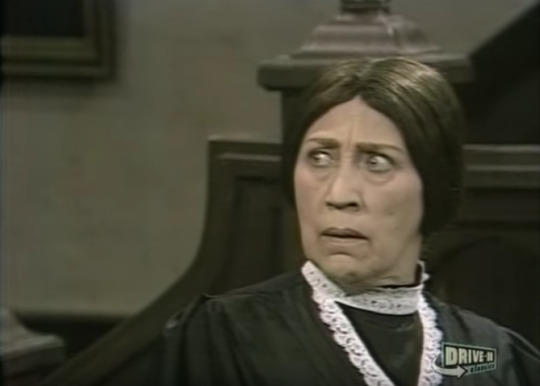
Sound familiar?
Yes, Chita bears a resemblance to our beloved Raxl. They even have a similar background, for Raxl, too, comes from a people indigenous to Mexico, according to Episode 23. Like Raxl, Chita is very old and has a mysterious magnetism that draws some people to her (which, in Raxl’s case, includes me). There are some minor differences--Chita doesn’t worship the Great Serpent, she uses gratuitous Spanish instead of gratuitous French, she has a living husband and grandson--but they are, in most ways, the same character. It’s clear that Ian Martin didn’t want to part with Raxl, and I don’t blame him one bit.
Also, for whatever reason, he was oddly insistent on both of them having a specific hairstyle. If you read the original script for the show’s pilot, you will see that he was almost as specific about Raxl’s hairstyle, mentioning “her hair tightly drawn over her ears to a small bun,” but less detailed about those of the other characters. Just an odd detail that probably bears little significance, but that I noticed.
Lisa tells Chita that Richard is on his way home with a new wife, a young, very wealthy orphan named Jenny Summers whom he met in the Philippines. This angers the ancient housekeeper, who argues that Jenny can never come to San Rafael
Because there is no place for her here--en la casa de La Señora! Everything here is hers--she still lives here, and will always live here. Her perfume is in every room, her pictures are everywhere, every ornament and ashtray and book I keep just the way she last touched it. There is no room for any other wife here! Oh, she will feel it, she will know it, because La Señora would never permit another woman to take her place (p. 16)!
Lisa insists that, despite the risk that Jenny won’t want to live on the estate and despite her equal displeasure about the situation, Chita keep an open mind regarding her and try not to be such a Mrs. Danvers about the situation. (OK, so she doesn’t actually say the last part; that’s just my paraphrase.) She also tries to pressure Chita into helping her take down the mementos of April at Richard’s orders, which she objects to, both for sentimental reasons and because they don’t have time to have the enormous fresco of April that adorns the former chapel. (Symbolism!)
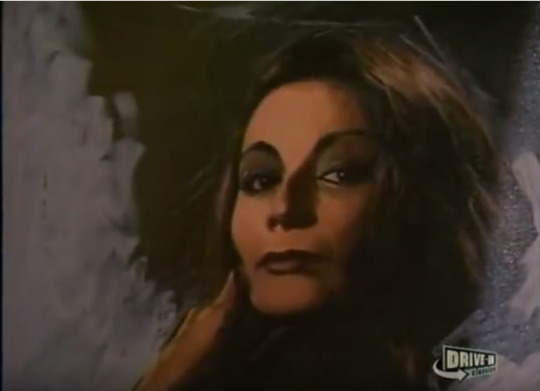
“It was a breathless and yet terrible beauty. For any woman who stood next to it had to be eclipsed” (p. 20).
Yes, you read that right: they rededicated the mission’s former chapel to the silver screen sex goddess April Tennant. After their wedding, Richard had a giant fresco of her painted there in place of its former altar. This is a clear indication that one or more of the people in this household worship April, whether literally or figuratively. More than that, the portrait glows like that of THE DEVIL JACQUES ELOI DES MONDES, and seems, like Jacques’ portrait, to be alive, the living essence of a dead person. “Most haunting of all was the feeling that this was the woman--that she could not have died, that any moment she would step off the wall, and her silver laughter would fill the house again (p. 20).”
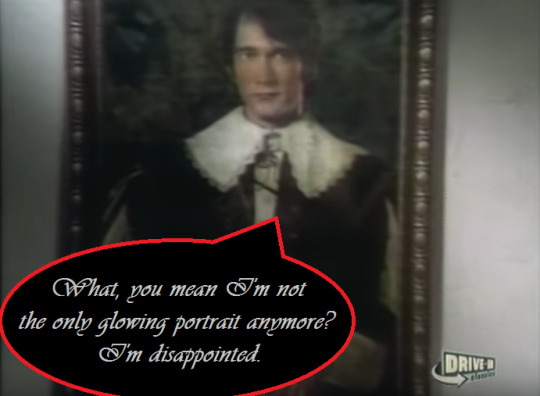
I’m sorry, Jacques. ;)
Coming up next: Jenny arrives at San Rafael and tries to adjust to living on an estate where almost everyone but Richard acts like they hate her.
{ Next: Part II -> }
#gothic fiction#cbs radio mystery theater#ian martin#joen arliss#shadow over seventh heaven#cbsrmt#strange paradise#related media#review#other reviews#ian martin's novels#analysis#gaze#rebecca#speculation on ian martin's original story#symbolism
5 notes
·
View notes
Text
Shadow Over Seventh Heaven Review, Part II: Jenny Wren and Richard Redbreast

Image source: “Da Luna et Ramsès- Doberman – Frère et Sœur -” by ERAL. Licensed under a Creative Commons Attribution-NonCommercial-ShareAlike 2.0 license.
Welcome back to my review series for Shadow Over Seventh Heaven, the second novel by Ian Martin, original headwriter for Strange Paradise and second most prolific writer for CBS Radio Mystery Theater, published under the name of his second wife Joen Arliss. It’s been two and a half weeks, and I have been dying to go back to recapping this not-quite-rare-but-close piece of Martiniana.
In Part I, we learned of the late April Tennant, legendary star of the silver screen, whose glamorous life ended suddenly when she fell from the cliffs on her home estate of San Rafael. We also learned of her husband Richard Morgan, a legendary actor in his own right, and met his overly attached sister Lisa, who is not pleased by his recent remarriage, and Chita, their very Raxl-esque servant who clings to April’s memory. In this installment, we will meet Richard and his new wife, Jenny, themselves as they return from the Philippines to the former Spanish mission which may or may not be haunted by the spirit of his first wife.
Chapter 3
We open with our heroine, Jenny (née Summers), and her new husband Richard at the Manila International Airport, where paparazzi are hounding them. “She had seen [crowds] at fiestas, at rallies for President Marcos or even his opponents [1], at rush hours, church holidays, national holidays. The Philippine Islands abounded in inland fish, and in rice, but most of all, in people. But she had never seen a crowd quite like this” (p. 22). She is a little frightened, but Richard, for whom this is apparently a regular occurrence, tells her to keep moving until they get through the sea of people--which, given the current circumstances around the globe, sounds like a nightmare even though this book takes place about forty years ago.
A reporter starts to interview her and reminds her, almost right after their marriage, that she is replacing the legendary April Tennant:
“Mrs. Morgan--you are the envy of most every woman in the world as well as here in the Philippines. How does it feel to be Mrs. Richard Morgan the second?”
“You don’t have to answer,” Richard said protectively.
“But I want to,” she said. “It feels marvelous! I’m the luckiest woman in the world!”
“Aren’t you a little afraid?” the young man persisted.
Jenny wasn’t going to admit that to a stranger.
“Why should I be afraid?” she said.
“You are replacing a very exceptional woman.”
Now the noose of fear tightened around her neck, so that momentarily she could not answer. It was Richard who did for her.
“My first wife is dead,” he said with barely repressed anger. “For God’s sake let April rest in peace. For her own sake as well as ours. Now please--we have a plane to catch” (p. 23).
They leave him and hounding turns to harassing as rabid Richard Morgan fans begin reaching for them, tearing off pieces of her collar and the Filipino-style flower appliqué on her skirt and stealing Richard’s pocket square. “It was a good-natured, adulating adoring crowd,” the narration insists, “but like every mass of humanity, a possibly dangerous and uncontrollable force” (pp. 23-24). Sorry, narrator, but to me, it still sounds like a COVID nightmare--literally. I’ve had nightmares about this kind of thing for months. Generally, I try to avoid writing about current events on here because I don’t consider it appropriate for a blog about escapist Gothic melodrama, but this scene reminds me of some of my recent dreams.
Anyhow, the crowd and the reporter only reinforce Jenny’s feelings that she’s already in April’s shadow. Before Richard took an interest in her, she was only the daughter of an obscure American ambassador, not even an actress like April. She just got married and already she is having second thoughts, and not because of her husband:
Then that miserable worm of fear began to gnaw at her again, and she so desperately didn’t want to face the truth. But the words said themselves inexorably to her, marching across the inside of her eyelids as though chiseled on some granite rock that revolved before her inner sight, or burned so deeply on an indestructible tape that they could never be eradicated. The trouble is April Tennant. The woman the whole world revered and loved. They only wanted to see Jennifer, weigh her, find her wanting. They knew nobody could replace April--and that nobody had the right to try. Only without realizing what she was getting into, Jenny had done it. For once, she was the big attraction. But they didn’t think she could measure up, and she wasn’t sure she could herself. How had she ever thought she could? (pp. 24-25)
As they head for their flight, a crowd of “smiling brown people” cheer for them to return, and one little Filipina girl even chases Jenny down to give her “a woven garland of sampaguita flowers” (pp. 25-26). I must admit that I don’t know much about Filipino history, but I have trouble imagining that a crowd of Filipino people would cheer on the (presumably white) daughter of an American official who, given U.S. foreign policy at the time, would have backed Marcos’ repressive regime. Do I believe that they cheer for an international celebrity like Richard? Yes. Would they want to wish him a happy marriage? Probably. But I can’t imagine them liking Jenny much, for reasons that have nothing to do with April Tennant.
Chapter 4
This chapter begins with a description of Richard Morgan’s appearance that is an entire page long:
His mouth was full, the lips unusually red, with just the slightest quirk in repose which suggested sardonicism...The nose was classic, intriguingly flawed by some old injury...The eyes were brown, so dark that they were almost black, smoldering under somewhat sullen brows...His hair was a great, tousled, tawny mane, unruly, and resistant to brush or comb. His eyebrows had a fierceness about them that seemed to challenge anyone to cross swords; but this aggressive effect was completely belied by the way one or another would twitch and cock upward as though laughing at the world--or perhaps himself. His chin was probably too prominent, but again the feeling of overconfidence and overwhelming strength was softened by the deep cleft in the middle of it that broke the uncompromising line. He was not a tall man--perhaps an inch under six feet--but he carried himself with the lithe balance of a jungle animal or a trained athlete, and there was hardly anyone who did not think of him as tall and powerful. He was a man who even in repose radiated a sense of kinetic and tireless energy (pp. 29-30).
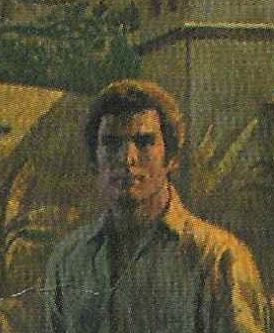
Richard Morgan, according to the cover artist.
Honestly, I was disappointed the first time I read this passage because he doesn’t much resemble Colin Fox. Virtually the only features the two have in common are the nose and the way they carry themselves--and (if we are talking about Jacques’ portrait) the lips. I always find it interesting how male authors describe the male characters whom others in the story find attractive, especially when said author is straight and writing for a female audience. Therefore, this is likely Ian Martin’s idea of what an incredibly handsome man looks like and/or his idea of what the average straight woman wants.
That, in turn, makes me wonder if this is how he visualized Jean Paul Desmond and his lookalike ancestor Jacques Eloi des Mondes, especially given that most of the other characters (and many fans, myself included) see them as incredibly handsome. Richard does have several facial features in common with John Bayliss, the actor originally cast in those roles, but there isn’t any evidence to suggest that their resemblance is anything more than a coincidence.[2]

The SP character whose appearance Richard’s description most closely matches, the Reverend Matthew Dawson. Lacks the unruly tawny hair and the sardonic lips and doesn’t carry himself like Richard, but the eyes are similar and they have the same chin. Not ugly (Dan MacDonald was better-looking IMO than the guy on the cover), but also not my idea of male perfection.
While relaxing on the plane, Jenny allows herself the luxury of thinking about herself instead of Matt Dawson’s tawny-haired twin. We learn that her name isn’t actually Jennifer--which contradicts the passage above where she calls herself that--but just Jenny, and that her parents named her after Jenny Wren from the (surprisingly dark) nursery rhyme “The Wedding of Robin Redbreast and Jenny Wren.” She relates in particular to the part where the wren says “I must wear my plain brown gown / And never go too fine,” because she dislikes not just putting on airs, but thinking about herself, period, which she attributes to her strict upbringing. She’s almost cartoonishly modest, which is pretty typical of Gothic ingenues and of Linda Barclay, the protagonist of Martin’s earlier “romantic suspense” book, Nightmare’s Nest, who was even more so.
We flash back to the evening she met Richard, who was apparently an old friend of Nene Ilusorio, one of her late father’s friends who became her close companion following his death in a helicopter crash. At that time, April was not yet dead, so Richard had to keep his dates with Jenny secret. They traveled out to the mountains together, where she showed him the rice paddies the locals constructed on the mountains with their irrigation system and where he won her heart by quoting Robert Burns’ poem “My Heart’s in the Highlands.” Apparently women find men who like Robert Burns irresistible, at least according to this and the Kitty Soames storyline on Dark Shadows. I can’t confirm, though, because no man has ever quoted Burns to me or given me a book of his poems.
Chapter 5
A filler chapter about Jenny and Richard’s flight from Honolulu (where they had a layover) to San Francisco. I got excited at one point when Richard said, “We had a picture half done that had to be scrapped because of her death” (p. 46), thinking at first that he was referring to the portrait and being reminded of two certain other portraits of a certain character from Strange Paradise. But then I realized, no, he means “picture” as in “movie,” not as in “painting,” and got disappointed. We also learn that Richard has an encyclopedic knowledge of all the classic poets and playwrights, not just Robert Burns. In a flashback, Richard recites Elizabeth Barrett Browning’s poem “How do I love thee?” for her in his amazing voice, leaving her “drunk on love” and “drunk on all [the poets to whom he introduced her]” (p. 54). If he sounds anything like Colin, I can understand why she’s so seduced by him reading poetry. Even so, if I were her, I wouldn’t be able to get past the fact that he’s quoting other people instead of using his own words to convey his love. If Jean Paul could come up with something new to say to his frozen wife four days a week for a month, then surely Richard can as well. He's just being lazy--or is he? The back cover (”WHAT LAY BEHIND THE MASK OF LOVE?”) hints at some possible deception on his part.
Chapter 6
Jenny and Richard arrive back in California, and the story starts to pick up again. This is roughly where “Here Goes the Bride” begins, not counting the teaser at the beginning. They are driving along the Pacific shore in a red Mercedes without air conditioning, and Richard refuses to let her roll the windows down because he doesn’t want anyone to recognize him. He angsts for a while about how, even though actors like him need the audience in order to live and “for the magic to come alive,” the audience has become increasingly like “a great, crouching tiger...a creature of emotion and whim that can turn on you suddenly and get completely beyond your control” (p. 59). He rants about how April’s fans worshiped her and made almost a cult around her, and about how they will most likely go ballistic if they see him with another woman instead of playing “the high priest, ascetic, mourning, forever dedicated to her memory” (p. 60). By driving the car with the windows up, he hopes to avoid the paparazzi and other stalkers on their way to San Rafael.
We learn in a flashback, by the way, that the car is Lisa’s and that Richard had Jenny disguise herself as her by putting on a hat and sunglasses. Jenny asks if she really looks like Lisa--which, if it were true, would imply that he reciprocated Lisa’s feelings for him, at least on an unconscious level--but he says no. Her hair is dark, while Jenny’s is “tawny gold” (p. 63), which I had forgotten, probably because Lisa reminds me too much of Cersei Lannister not to picture her as such. Also, Richard has dark hair now, too? Two chapters earlier, his hair was tawny like Jenny’s. I guess this book’s editor didn’t notice the continuity error--not that it was that important, anyway.
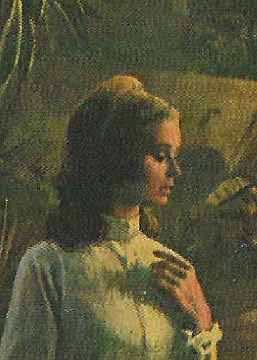
The woman on the cover, most likely Jenny.
While waiting for Juan to open the gates, Jenny stares in awe at the fortifications surrounding the estate--which, as you may recall from Chapter 1, Richard had built around the estate, allegedly to keep his and April’s rabid fans out, and even added the broken glass himself. “It’s like a fortress--barbed wire, broken glass,” she exclaims. “And the gate looks as though you borrowed it from the Bastille!” The mention of the Bastille reads like subtle foreshadowing of a later reveal, but, per my self-imposed rule against spoilers, I won’t say any more about it for now. The gates open and we hear Richard’s pack of snarling dogs for the first time, the sound of which makes her uneasy. She asks about them and Richard just says, “They’re our guardian angels. They patrol the grounds at night” (p. 67).
We also meet Juan, “a square-set Mexican...a man of some sixty years, with a sun-whipped face that was as craggy and seared with lines as the landscape they had just passed outside the gate” and “blackened teeth in a dark-brown face dried by so many days of sun that the oil had cooked from the skin until it was tanned like animal hide” (p. 67). Here we have the third piece of evidence of the dystopian nature of life at San Rafael. First, we saw the excessive level of security which Jenny compared to the most notorious prison of France’s ancien régime; next, we heard snarling from Richard’s kennel; and now, it is implied that Juan doesn’t get paid enough to afford either modern dentistry, sunscreen, or a good moisturizer. Combine this with Richard’s refusal to romance Jenny in his own words and his insistence that they drive with the windows up and no air conditioning in southern California, and his behavior abounds with red flags. It does make you wonder what lay behind the mask of love, and it’s quite reminiscent of early Jean Paul and his control-freak tendencies even when Jacques isn’t possessing him.
Unlike Quito, his Strange Paradise equivalent, Juan can speak and often does. Half of his dialogue is in Spanish, the other half in English. Sometimes he will even randomly throw a Spanish word into a mostly English sentence (ex. “They will not be tranquilo till they see you for themselves” (p. 68), which, even with my extremely limited knowledge of Spanish, I know should read “tranquilos,” because he is talking about the dogs). This, combined with his appearance and the mention that he stands “with Indian patience, unmoving and stolid” (p. 70), makes him come across as rather stereotypical. It’s surprising how SP, despite being a decade older, has actually aged slightly better than this book in terms of racial matters--although, given that this book is forty years old, that’s to be expected.
Upon meeting Juan, Jenny feels “an icy whisk of rejection that shuddered between her shoulderblades [sic]” (p. 68), as though she knows before he says anything that he is a card-carrying member of the Cult of April Tennant. He reveals to Jenny that the dogs “are trained to kill...anyone who does not belong here,” and that they will only protect her “if they learn to know you belong” (p. 70). Then he casts a huge heaping of doubt on whether that will ever happen:
Jenny’s voice was hushed and sympathetic.
“You must have loved her very much.”
He lifted his head proudly, the dark deep-set eyes flashing from under the craggy brows. “She was La Senora de la Casa!”
The statement was simple and obdurate. A declaration of faith that shook Jenny because it was so basic. She found herself fighting to keep her throat from tightening up as she answered tentatively, “I hope you won’t blame me too much for taking her place.”
The answer, although delivered with remote courtesy, was flatly uncompromising. “There is no one to take her place” (p. 71).
Richard interrupts them when he returns with all six of his dogs on leashes, which frightens her even more now that Juan has given her reason to suspect that the dogs, too, worship April Tennant and will not accept anyone in her place. He probably wants them to reject her, especially because he never thought to give her some bones or treats to use to win their loyalty. If I were in her position, I would be begging Juan for some good cow knuckles filled with marrow for them to gnaw on. Then--assuming that he obliged--I’m sure they would love me forever.
Chapter 7
Richard introduces Jenny to his dogs, six Doberman pinschers named for “the six noblest Romans of them all. Caesar, Brutus, Cassius, Marc Anthony--Mark for short--Cinna, and Casca” (p. 74). He has them demonstrate their obedience to him--while he demonstrates more of his own control-freak-ness--by ordering them to sit, then charge, then shake hands with her. Much to Juan’s likely chagrin, Richard has every intention on making the dogs recognize her as their new mistress, and so he has her give them dog biscuits.
They all appear to like her except for Casca, who is slightly less quick to obey Richard’s commands and also reluctant to kiss Jenny’s hand, unlike the others. She’s relieved to have found acceptance from them so quickly, but Juan has to rain on her proverbial parade by staring silently “with no solitary hint that he shared the dogs’ enthusiasm for Jenny” (p. 77).
Chapter 8
They get back in the car and continue driving (how vast is the estate?), this time with the top down because of the lack of prying eyes. We learn as they drive to San Rafael that April’s mother had it built, something that Richard doesn’t want to admit, but which he makes obvious at least to the reader:
“When April’s mother-” He choked that off and rephrased, biting his tongue for bringing up her name. “I mean, when the property was first bought, some foundations were discovered where the house was to be built; and the architect sold Apr--ah--them on recreating a Spanish mission. It was picturesque, but not very practical for modern living, so when Ap--I mean, when I was married and entered the picture, some changes were made [like the addition of that portrait, I assume]” (p. 79).
Jenny expresses her doubts that San Rafael “will open its arms to [her] and invite [her] in,” and he responds by kissing her, which doesn’t answer her question, but whatever:
He lifted her chin, tilting her face toward him gently, his eyes flickering back and forth across hers, his own gleaming and almost mesmeric as the sun slowly slipped down over the horizon. Then very slowly he touched his mouth to hers, his lips opening against hers as he quite suddenly pressed against her ardently, his tongue lightly touching hers, engaging it, probing and awakening her mouth and the answering touch of lips and tongue, till all the world was blotted out, and there was only the rush of teeming blood, throbbing in the head and along all the nerves to the end, and the surge of desire that blotted out anything else (p. 80).
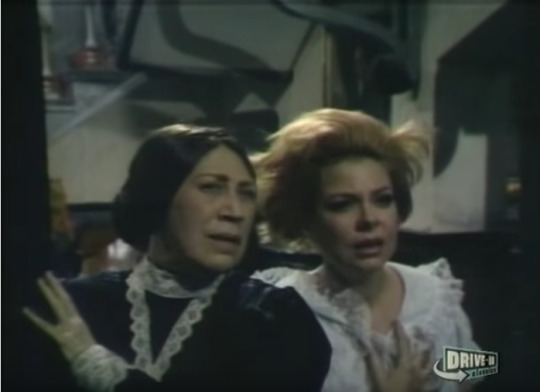
Unbeknownst to them, Chita and Lisa are spying on them, wondering why the car stopped! (ROFL) When Chita realizes what’s going on, she criticizes Richard in true prudish Raxl fashion: “That he would be so shameless in daylight,” says she. “To take this woman in his arms--” (p. 81). Lisa reminds her that they are married now; although the narration doesn’t mention a twinge of jealousy, I’ve no doubt in my mind that she wishes she were Jenny in that car.
Richard and Jenny get out and Lisa rushes to hug them. Surprisingly, she acts outwardly friendly towards Jenny, who notices that “[Lisa’s] dark blue eyes were penetrating as they took in Jenny in one swift appraisal. They might have frightened Jenny except for the deep spark of interest in them, and the wide smile which she didn’t realize was uncharacteristic for LIsa” (p. 82).
Then he introduces Jenny to Chita, whom she instantly dislikes. “From her long sojourn in the Philippines,” the narration tells us, “she was very conscious of relationships between employer and servant. Not that she subscribed to the sort of feudal system that existed there, but simply because she was an extraordinarily sensitive girl who was responsive to human vibrations. And she could tell that Conchita’s were not right about her” (pp. 83-84).
Conchita, likewise, has a bad first impression of Jenny, thinking her a snob because of her use of Castilian instead of Mexican Spanish. But Jenny doesn’t realize that, instead noticing and fixating on the portrait of April:

Either by accident or design, those were the lights which Conchita had turned on. In the gloom of the hall, the full-length portrait dominated everything. Every detail of that matchless beauty was so sharp and clear that the figure of this lovely woman seemed to be alive and breathing.
And to Jenny, to be warning her and saying, “Why did you come? You don’t belong. How did you dream you could take my place? Did you think I would ever allow you to? This is my home, and Richard is mine. I’ll never let either of them go” (pp. 84-85)!
Compared to the beginning, Chapters 3 through 8 are not very meaty. These chapters are like chicken wings compared to the drumsticks that were the intro and the first two chapters. The main similarities that I found between these chapters and Strange Paradise were (1) the revelation that, like Maljardin-era Jean Paul, Richard is a control freak who is obsessed with his privacy and (2) the introduction of Juan, who fills Quito’s role as loyal male retainer but talks using occasionally inaccurate gratuitous Spanish (the “tranquilo” line). There is a lot of filler and also perhaps a little too much repetition of the idea that no one can ever take April’s place as mistress of San Rafael, so not as enjoyable as Part I or the next part of the story.
Coming up next: We get our first set of hints about April’s mysterious past, while Jenny tries to adjust to life in a house that may or may not be haunted by her spirit.
{ <- Previous: Part I || Next: Part III -> }
Notes
[1] Did Ferdinand Marcos even allow his opponents to hold rallies? As I said above, I don’t know much about Filipino history, but I do know that he ruled over the Philippines as a dictator and tried to suppress any opposition to him. Most likely either the above passage is inaccurate or what Martin is describing are actually political protests, but it’s worded in a way that suggests that he thought of Filipino politics in the 1970s-1980s as more democratic than they actually were.
[2] I did look up Michael Wager, the actor who played Richard in the original radio drama, and he did resemble this description (and was indeed quite handsome, if I do say so myself). However, it would be strange for Martin to have Richard look like his original actor when none of the other characters in the book do. Notably, Jenny’s description in the book as a gray-eyed blonde bears no resemblance to her original actress Ruby Dee--which I suspect may have something to do with the publisher wanting to avoid controversy for depicting interracial marriage, as Ruby Dee was black.
#shadow over seventh heaven#joen arliss#ian martin#cbs radio mystery theater#gothic fiction#strange paradise#related media#review#ian martin's novels#continuity errors#dark shadows#foreshadowing#the irresistible seductive power of robert burns#rebecca
0 notes
Text
Episode 39 Review: Pirates of the Caribbean

{ YouTube: 1 | 2 | 3 }
{ Full Synopses/Recaps: Debby Graham | Bryan Gruszka }
Hello and welcome again to my Garden of Evil, today with what I believe may be my shortest entry since last July. This time around, I want to focus on the Raxl and Vangie scenes set in the crypt, because, in my not-so-humble opinion, they’re the only interesting scenes in this entire episode. With even more recap than the average Thursday episode, this one is mostly boring. Hell, even the Lost Episode summary for this one is not that interesting:
If Rev. Matt Dawson refuses to attend Vangie's next séance, he may doom the girl he loves.[1]
I mean, it’s pretty clear that Holly is already doomed, based on the accident in Episode 30, the slashed portrait, and Vangie’s association of her with the Nine of Swords. But I digress.
In the second half of this episode, we do have a telling new revelation about the message that appeared in Raxl and Quito’s writing box following the disastrous séance three episodes ago. It connects to a period of Jacques’ past that the show left mostly unexplored. Yes, today we will be exploring Jacques’ career as a pirate, which was alluded to in Episode 6 and confirmed in this episode, only to never again be brought up on television. So, without further ado, let’s explore what we know of this chapter of the past of THE DEVIL JACQUES ELOI DES MONDES!
*sting and lightning flash*

The original message in the writing box, from Episode 36.
To recap: At the end of the séance, Raxl discovered a message left in the sand of the writing box that she and Quito use to communicate with spirits. She tried to preserve the message with the hopes that the Conjure Woman Vangie Abbott would be able to interpret it once she recovered from the cataleptic trance that Jacques put her in by dropping a chandelier on her during the séance, but this was not to be, because Jacques found the box and obscured the message before Vangie could recover. Now that she has recovered thanks to the potion that he mixed for her, Quito delivers fresh sand to the two priestesses so that Raxl can try to recreate the message from memory for Vangie to read.

Raxl: "When you were in the séance, you did not know when you were in a trance and you did not know that the spirit had warned us that there was an evil presence at that séance. But it was written here."
Vangie: "In the ancient language and symbols?"
Raxl: "Oh, you know them so well. I read so little. They spoke of the conjure doll and the silver pin which would destroy the Devil and return him to the eternal flame! Where they were hidden, I could not tell. I could not read!"
Vangie: "Do you remember the symbols? Try to write them!"
Raxl: "May the Great Serpent guide my hand well."

Next scene, after the commercial break:
Raxl: "The first I remember well. I have long known it."
Vangie: "A man. Not a real man. A doll, an effigy. An instrument."
Raxl: "Symbols have many words, but one meaning."
Vangie: "A piercing instrument, but not a weapon. The silver pin!"
Raxl: "The first message was left to us by a friendly spirit who came to the séance to save us all."
Vangie: "What spirit? I don't remember. I felt only the Devil."
Raxl: "What spirit? Perhaps Erica Desmond, whom we sought to summon. Who, at the next moment, might have spoken, had not the Devil interfered."
Vangie: "Yes, Erica might well have been there, within a hand's touch of the husband who sought to call on her through me with such agony and grief. I've never felt vibrations of such love and sorrow. There would have to be a response. Erica would be compelled to reply. Raxl, now write the symbols you could not read."

Raxl tries to remember the remaining symbols, but can’t. Vangie tells her to remember, so she searches her memory banks while Holly tries unsuccessfully to convince Matt to quit ministry and become an engineer. Finally, she remembers--or thinks she remembers--something:

Raxl: "Can you read it yet?"
Vangie: *shakes head* "Perhaps it was like this?"

Raxl: "I cannot tell."
Vangie: "That would be fire. Fire, an all-consuming fire."
Raxl: "From Hell? Then it would destroy us all!"
Vangie: "No, no, that makes no sense. We must be wrong. We must try again. Think, Raxl!"

Vangie: "No! Raxl, no!"
Raxl: "It-It WAS like this!"
Vangie: "A vessel of the sea, a great vessel with weapons. A ship that destroys."
Raxl: "The pirate vessel of Jacques Eloi des Mondes, when he seized this island centuries ago!"
Vangie: "The conjure doll that doomed him wouldn't be on the ancient ship of Jacques Eloi des Mondes."
Athough they rule out this possibility and decide to search the supply boat--unsuccessfully--for the doll and pin instead, this revelation is important. This right here is confirmation not only that Jacques stole the island from someone else back in the 17th century, but that, during his lifetime, he lived as a pirate. And a successful and ruthless pirate he must have been! Back in Episode 6, Jacques told Alison not only that he was a “free looter” (likely a misreading or mispronunciation of “freebooter”) in life, but that “he was the beginning of the family’s true wealth. Legend has it that in the coral caves beneath the island of Maljardin, he buried a king’s ransom, which still lies hidden.”
Originally, we would have learned more about this secret history of Jacques Eloi des Mondes on the show. This Lost Episode summary for Episode 42 describes Jacques as “a French buccaneer,” implying that this detail become important starting in that episode:

Source: Cleveland Plain Dealer (November 7, 1969). I plan on discussing this in more detail in my Episode 42 review.
In 1975, five years after the show’s cancellation, Ian Martin wrote a script for CBS Radio Mystery Theater called “To Die is Forever,” with a premise and characters nearly identical to those of Strange Paradise. (A transcription of the radio play can be found here.) In the introduction, the announcer states that the piece’s villain, Richard the Red-Hand “bought [his family’s island] with the blood money and booty of a hundred pirated ships.” While this method of acquisition differs from Jacques’ alleged conquest of Maljardin, his characterization otherwise remains mostly the same. (Richard does come across as less refined than Jacques and talks more like a stereotypical pirate, but those are minor differences.)
Still, no Strange Paradise-related media provides more backstory about the pirate career of Jacques Eloi des Mondes than Dorothy Daniels’ Paperback Library novels, especially the final installment of the trilogy, Raxl, Voodoo Priestess. Published in August 1970, the novel centers around an attempted invasion of Maljardin by a crime boss named Vidran, which Jean Paul and Jacques team up to stop. The novel draws parallels between this and a similar incident in 1681 when a Spanish armada attempted to take the island:
"It was in August, 1681. Ah, this Jacques was a sly devil. He knew the Armada was on its way. Word had been brought by fishermen who spotted it. Jacques then made haste to transfer from the mainland to Maljardin all of the gold and gems. He buried them secretly and no one was the wiser. He had a friend named Emile, a young man about Jacques’ age. Emile helped him prepare for the invasion and bombardment which was certainly coming. But, according to Jacques’ own writing, Emile was not the strongest man in the world--speaking in terms of character, not physical strength. He was also enamored of a young lady taken prisoner during one of the pirate raids.”[2]
Ian Martin himself later re-used the trope of a wealthy family descended from pirates in his first novel, Nightmare's Nest, published in 1979 under the name of his second wife Joen Arliss. The novel's villain, Jason Greaves, is an illegitimate descendant of the reclusive and aristocratic Rensevelt family who, like the des Mondes, live in a castle on an island and acquired their wealth through pillaging and plundering. According to him, the 17th-century Rensevelts were "pirates, usurers, thieves, murderers, [and] despoilers of women".[3] Later, the family’s kind-hearted heir Ted mentions "the history of my family and the pirates who began and perpetuated it. The lure of gold, the thirst for money, that's the Rensevelt tradition!" (p. 232). Like Jacques, Jason is also tall and dark, oozes sex appeal, and has "that open, free, untrammeled laugh of a man whose conscience is untroubled" (p. 209). So, while there aren’t enough similarities to warrant a full review series for Nightmare’s Nest the way I did for Shadow Over Seventh Heaven last year, it does show some clear SP influence.
There is one other interesting part of this episode that I think I should mention. Raxl seems to have become disillusioned with her partnership with Matt and now wonders if he and his religion are a “disruptive force” on the island:



I know it looks like she’s talking to Vangie in the second screencap, but she’s actually backacting with Matt. Also, “end” in the last image’s subtitle is supposed to read “and.” I’ll never understand why the automatic captions have such trouble with her accent, because I can usually understand her just fine.
Coming up next: Jean Paul and Matt argue over the next séance and I use clues from multiple Lost Episode summaries to determine what happened in the original script for Episode 40.
{<- Previous: Episode 38 || Next: Episode 40 ->}
Notes
[1] Minneapolis Star (November 6, 1969).
[2] Dorothy Daniels, Raxl, Voodoo Priestess (New York: Paperback Library, 1970), p. 108.
[3] Joen Arliss, Nightmare's Nest (New York: Popular Library, 1979), p. 212.
#strange paradise#ian martin#maljardin arc#week 8#episode 39#foxless episodes#review#analysis#cbsrmt#dorothy daniels#ian martin's novels#lost episode summaries#nightmare's nest#paperback library#sign of the great serpent#sp and religion#speculation on ian martin's original story#unexplored plot point#the writing box
1 note
·
View note